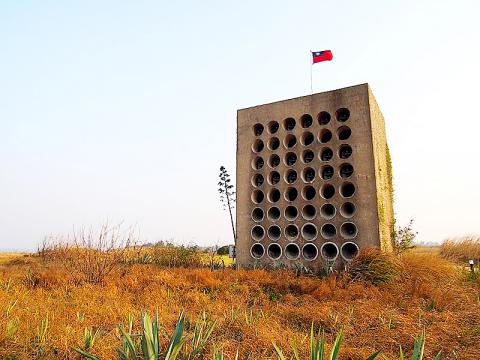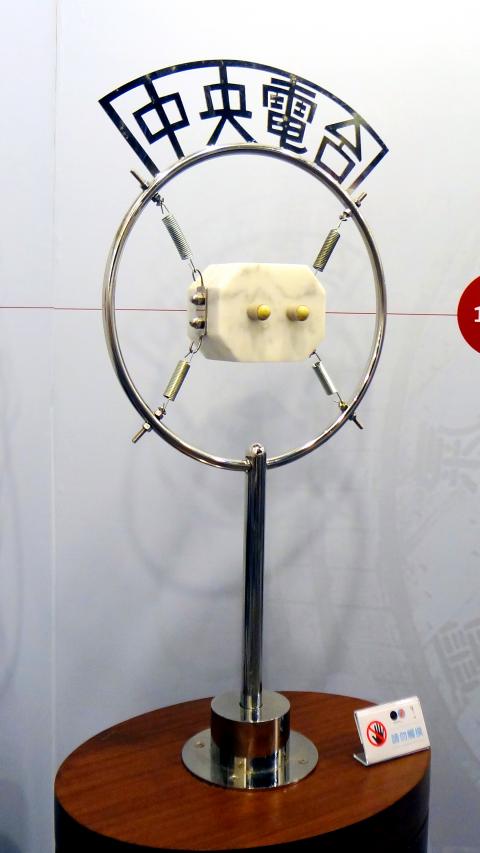JUNE 10 to JUNE 16
With programs such as Taiwan’s Advancements and Every Road Leads to Freedom, the Matsu Broadcasting Station (馬祖廣播電台) commenced its daily broadcasts toward the coast of China’s Fujian Province on June 15, 1959.
At the ribbon-cutting ceremony, then-political warfare bureau chief Chiang Chien-jen (蔣堅忍) announced the station’s objectives: to provide entertainment to the soldiers stationed on the tiny island off the coast of China and to “broadcast the voice of justice and freedom to sway the hearts of our compatriots on the mainland.”

Photo courtesy of Wikimedia Commons
According to the Chronicle of Lianjiang County (連江縣誌), that year the station broadcast 1,872 hours of propaganda, leading to 53 communist defections.
Although Taiwan had been broadcasting propaganda to China since 1949, the station’s establishment was part of a nationwide effort in 1959 to ramp up its psychological warfare operations. In Matsu, this included upgrading the existing loudspeakers and setting up a facility to send balloons containing propaganda messages.
TURNING THE ENEMY

Photo courtesy of Wikimedia Commons
The 1960s official booklet Radio Psychological Warfare (廣播心戰) details the spirit behind such propaganda broadcasts.
Its introduction reads: “The 700 million people on the mainland are our compatriots, and most of them are potential revolutionary forces who are determined to oppose Mao [Zedong (毛澤東)] and communism. We should show them our concern instead of reprimanding them; comfort them instead of aggravating them; cheer them on instead of bringing them down. We need to repeatedly reassure them that, ‘President Chiang [Kai-shek (蔣介石)] will definitely return and save our suffering compatriots.’”
In May 1954, the Central Broadcasting System’s (中央廣播電台) China division was upgraded to department status, with a psychological warfare team of 80-odd members from various institutions, including a number of former Chinese Communist Party (CCP) soldiers who chose to come to Taiwan after the Korean War.

Photo courtesy of Wikimedia Commons
The department laid out 10 principles, which entailed destroying communism with freedom, dignity and Chinese Nationalist Party (KMT) founder Sun Yat-sen’s (孫逸仙) Three Principles of the People (三民主義). Long-term themes included “the advancement and growth of Free China,” “traditional Chinese culture and morals,” examining “the crimes of the CCP’s violent rule” and “persuading youth to renounce communism.”
With American support, the broadcasts reached as far as Tibet, with programming in Mandarin, Cantonese, Hoklo, Hakka, Shanghainese, Tibetan, Mongolian, Uighur and Russian.
The booklet states that “despite the strict postal censorship by the CCP, our listeners in China are willing to risk their lives to send us mail.” Most of the mail in 1967 came from coastal areas in China’s Guangdong and Fujian provinces, sent by young intellectuals and CCP officials.
“Eighty percent of the letters consist of reports on anti-communist activity. They want to establish contact and receive our support, and most importantly they want us to provide them with missions… The rest are accusations of CCP violence, various intel and requests for aid.”
While the CCP was commonly referred to as “communist bandits” in Taiwan, the broadcasts used neutral or friendly terms instead, leading some domestic listeners to accuse the government of trying to be chummy with the enemy.
But as Wang Lung-hua (汪隆華) writes in a 1969 “Study of Taiwan’s Psychological Warfare Broadcasts Toward the Mainland” (台灣地區對大陸心戰廣播之研究): “If there’s a group of bandits in front of you, and you want to destroy them without suffering any losses, what do you do? The only way is to persuade them to change their ways. To do that, you can’t call them bandits to their faces.”
FRONTLINE PROPAGANDA
After another upgrade in 1966, the Matsu Broadcasting Station was capable of reaching the provinces of Sichuan, Hunan and Shaanxi in China.
Back then, the Golden Bell Awards (金鐘獎) had a “Programs Targeting the Mainland” category for such propaganda programs, with subcategories for news, political analysis, variety entertainment and special programs. Matsu’s station claimed two trophies over the years for original programming that was “firm in its stance.”
It was not an easy task to be a broadcaster on the frontlines in isolated Matsu, especially as a female, but it seemed to have been a prestigious position for which many vied. Almost 300 young women applied for the job in 1972, with only three making the cut. Over the next few years, the station added local broadcasters, since the Matsu dialect was very similar to that spoken in Fuzhou City in China’s Fujian Province.
With the advent of television and the defusing of cross-strait tensions, the radio station’s staff dwindled over the years. By 1980, it no longer had a production team, instead relaying programs from the main stations in Taiwan. The station finally closed down in June 1991, a month after then-president Lee Teng-hui (李登輝) terminated the period of national mobilization for the suppression of communist rebellion.
Taiwan in Time, a column about Taiwan’s history that is published every Sunday, spotlights important or interesting events around the nation that have anniversaries this week.

Towering high above Taiwan’s capital city at 508 meters, Taipei 101 dominates the skyline. The earthquake-proof skyscraper of steel and glass has captured the imagination of professional rock climber Alex Honnold for more than a decade. Tomorrow morning, he will climb it in his signature free solo style — without ropes or protective equipment. And Netflix will broadcast it — live. The event’s announcement has drawn both excitement and trepidation, as well as some concerns over the ethical implications of attempting such a high-risk endeavor on live broadcast. Many have questioned Honnold’s desire to continues his free-solo climbs now that he’s a

As Taiwan’s second most populous city, Taichung looms large in the electoral map. Taiwanese political commentators describe it — along with neighboring Changhua County — as Taiwan’s “swing states” (搖擺州), which is a curious direct borrowing from American election terminology. In the early post-Martial Law era, Taichung was referred to as a “desert of democracy” because while the Democratic Progressive Party (DPP) was winning elections in the north and south, Taichung remained staunchly loyal to the Chinese Nationalist Party (KMT). That changed over time, but in both Changhua and Taichung, the DPP still suffers from a “one-term curse,” with the

Jan. 26 to Feb. 1 Nearly 90 years after it was last recorded, the Basay language was taught in a classroom for the first time in September last year. Over the following three months, students learned its sounds along with the customs and folktales of the Ketagalan people, who once spoke it across northern Taiwan. Although each Ketagalan settlement had its own language, Basay functioned as a common trade language. By the late 19th century, it had largely fallen out of daily use as speakers shifted to Hoklo (commonly known as Taiwanese), surviving only in fragments remembered by the elderly. In

Lines between cop and criminal get murky in Joe Carnahan’s The Rip, a crime thriller set across one foggy Miami night, starring Matt Damon and Ben Affleck. Damon and Affleck, of course, are so closely associated with Boston — most recently they produced the 2024 heist movie The Instigators there — that a detour to South Florida puts them, a little awkwardly, in an entirely different movie landscape. This is Miami Vice territory or Elmore Leonard Land, not Southie or The Town. In The Rip, they play Miami narcotics officers who come upon a cartel stash house that Lt. Dane Dumars (Damon)